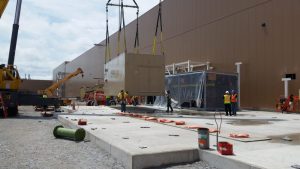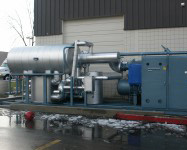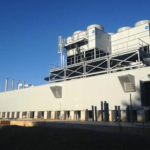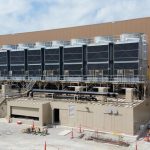The Challenge
Hospitals are heavily regulated in terms of their size, total number of beds, the services they can provide, and fees they can charge. Given these regulations, it is a challenge to maximize the value of the facility.
Hospital facilities are built to last a long time and are among the most energy intensive buildings. Consequently, the mechanical systems must have a long service life, be of the highest quality, and be as efficient as practical.
Holy Cross Germantown Hospital in Germantown, Maryland, needed a solution that maximized the allowable area of the building, provided very high-quality mechanical components and offered maximum efficiency
The Solution
The solution involved the incorporation of an Epsilon Industries packaged mechanical plant. This is a free‐standing, completely factory designed, engineered, and fabricated mechanical plant. It consists of boilers, chillers, pumps, cooling towers, and electrical system.
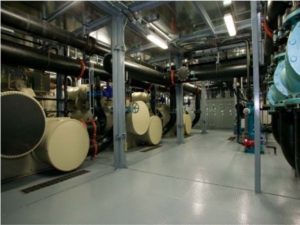
This 2,000+ ton plant is enormous at over 5,000 ft2, yet it would have been twice that size had it been field built.
Working closely with the engineering firm, Epsilon used advanced 3D CAD to optimally arrange the system’s components. This, plus their closely controlled factory fabrication processes, resulted in minimum space required while ensuring adequate access.
The entire plant is classified as a piece of mechanical equipment (even though it shipped in 17 sections) because it is factory fabricated and bears the ETL label.
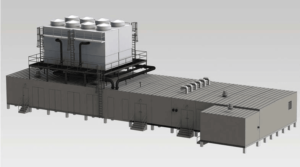
As a result of the optimal system design, Holy Cross was able to devote what would have been 5,000 ft2 or even 10,000 ft2 of mechanical room space inside the building to health services related space.
In addition to the system design, Epsilon provided job site labor and expertise during plant assembly and start‐up.
Refrigeration consists of three‐550-ton Daikin model WME magnetic bearing centrifugal chillers and two 190-ton Daikin TGZ Templifier water‐to‐water heat pumps.
Depending on fuel costs, the plant can produce hot water via gas, oil, or electric heat pump. The Templifier heat pumps “amplify” 44° CHW to 140° HW. The boilers are of the dual‐fuel 97% efficient condensing type. Sufficient structural integrity is provided to allow mounting of the heavy cooling towers on the plant’s roof.
The electrical distribution system consists of high voltage input switchgear and transformer inside a 1-hour fire‐rated enclosure. It serves chillers, towers, boilers, Templifier heat pumps, pumps, domestic hot water equipment, and fire pump.
An Allen‐Bradley PLC controls the entire facility through a local touch-screen interface. In addition, the PLC is connected to the main building BMS.
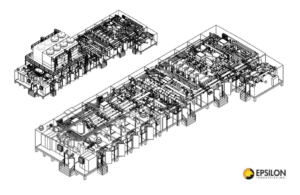
A packaged plant has many benefits. Not only is it a higher quality installation than a field‐built system, it is also less expensive, reduces engineering time, requires far less construction time, and allows the owner and engineer to get exactly the equipment and level of quality they want.
On this project, Epsilon worked closely with Holy Cross, the engineering firm, and the general and mechanical contractor on costs, design alternatives, equipment selection, and system layout. As a result, Holy Cross Germantown Hospital got exactly what they needed, at the right cost.
The plant qualified for a significant rebate from Pepco under the Empower Maryland Act.

